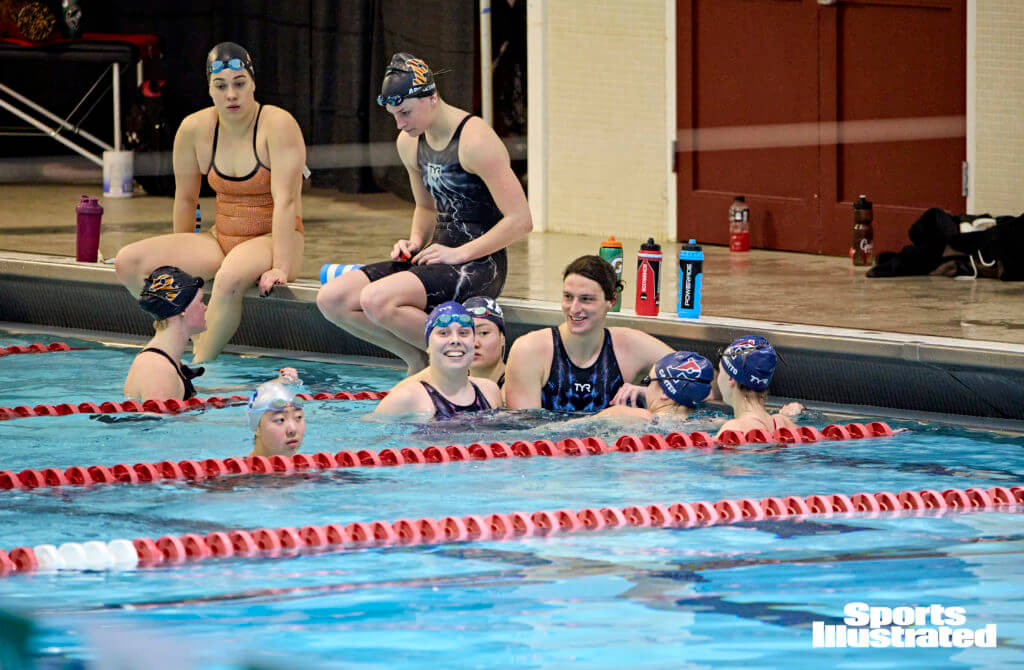In a groundbreaking move that has ignited fierce debate across the sports world, the National Collegiate Athletic Association (NCAA) has announced sweeping policy changes affecting transgender athletes and women’s sports. The decision comes in the wake of high-profile controversies involving swimmer Lia Thomas, the first openly transgender athlete to win an NCAA Division I championship, and Riley Gaines, a former University of Kentucky swimmer and vocal advocate for fairness in women’s sports. Both athletes have responded swiftly to the NCAA’s actions, setting the stage for a heated battle over the future of competitive sports.
NCAA’s New Policy: What Changed?

The NCAA’s new policy, unveiled in a press release, aims to address the growing concerns about fairness and inclusivity in women’s sports. Key changes include:
- Gender Eligibility Requirements
Transgender women (athletes assigned male at birth) will now be required to undergo at least three years of hormone therapy and meet specific testosterone level thresholds to compete in women’s sports. This rule is intended to ensure a level playing field while maintaining opportunities for transgender athletes. - Separate Competition Categories
The NCAA is exploring the creation of additional competition categories, such as an “open” division, where athletes of all gender identities can compete without restrictions. This would allow transgender athletes to participate while preserving women’s sports as a protected category. - Increased Transparency and Research
The NCAA has pledged to fund independent research on the impact of transgender athletes in women’s sports and to establish a task force to review policies regularly.
Lia Thomas’s Response: Fighting for Inclusion

Lia Thomas, who made history in 2022 by becoming the first transgender athlete to win an NCAA swimming title, has condemned the new policy as discriminatory. In a statement released on social media, Thomas vowed to fight the changes.
“These new rules are a step backward for inclusivity and equality in sports,” Thomas wrote. “Transgender athletes like myself deserve the same opportunities as everyone else to compete and succeed. I will not be silenced, and I will continue to advocate for a future where sports are truly inclusive.”
Thomas’s legal team has already announced plans to challenge the NCAA’s policy in court, arguing that it violates Title IX, the federal law prohibiting sex-based discrimination in education and athletics.
Riley Gaines’s Response: A Victory for Fairness
Riley Gaines, who tied with Thomas in the 200-yard freestyle at the 2022 NCAA Championships, has been a prominent voice in the debate over transgender athletes in women’s sports. Gaines praised the NCAA’s decision, calling it a “victory for fairness and the integrity of women’s sports.”
“This is a step in the right direction,” Gaines said in an interview. “Women have fought for decades to have our own spaces in sports, and these changes ensure that female athletes can compete on a level playing field. I’m grateful to the NCAA for listening to the concerns of so many athletes and advocates.”
Gaines has also announced the launch of a new advocacy organization, Fair Play for Women, dedicated to protecting women’s sports and promoting policies that ensure fair competition.
Public Reaction: A Divided Nation

The NCAA’s decision has sparked intense reactions from all sides. Supporters of the new policy argue that it strikes a necessary balance between inclusivity and fairness, while critics claim it unfairly targets transgender athletes.
- “Finally, the NCAA is standing up for women’s rights. This is a win for female athletes everywhere.”
- “This policy is blatantly transphobic. Trans women are women, and they deserve to compete.”
- “It’s about time someone prioritized fairness in sports. Thank you, NCAA!”
- “This is a dark day for inclusivity. Trans athletes belong in sports, period.”
The Bigger Picture: The Future of Women’s Sports
The NCAA’s policy changes come at a time when the debate over transgender athletes in sports is reaching a boiling point. Similar discussions are happening at the state, national, and international levels, with organizations like World Athletics and FINA (the international swimming federation) implementing their own restrictions on transgender participation.
As the legal and cultural battles continue, the future of women’s sports hangs in the balance. Will these changes preserve the integrity of women’s competitions, or will they be seen as a setback for inclusivity and equality?
What’s Next?
With Lia Thomas preparing to challenge the NCAA in court and Riley Gaines launching her advocacy organization, the fight over the future of women’s sports is far from over. The NCAA’s decision has set the stage for a landmark legal and cultural battle that could reshape the landscape of competitive athletics for years to come.


